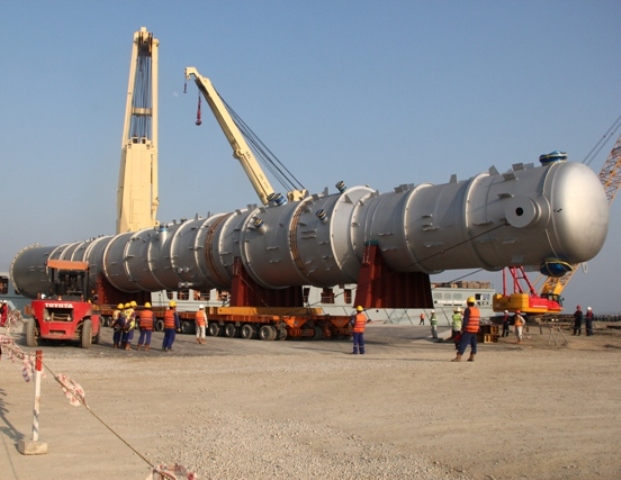Nghi Son Refinery may not be eligible for preferential selling price
 |
| illustration photo |
The reason is that Nghi Son’s products do not meet the Euro 4 standards imposed recently by a government meeting.
According to the conclusions oft the November 7 government meeting on the roadmap to apply the standards on emission set out in Decision 49/2011/QD-TTg, in 2017-2022 gasoline and fuel products in Vietnam will have to meet the Euro 2 standards if they are produced by Dung Quat Refinery, and Euro 4 standard if they are from other refineries and factories that came into operation after Decision 49/2011/QD-TTg became effective.
As per this conclusion, NSRP’s products will have to meet Euro 4 standards, which they do not.
The Ministry of Industry and Trade said that last year NSRP submitted a document to the government, saying that its products do not meet the Euro 4 and 5 standards and proposed the government to loosen the standards.
According to the agreement signed between the investors of the complex and the Vietnamese government, for 10 years state-owned national oil and gas group PetroVietnam has to buy any amount of products that the company running the refinery complex, Nghi Son Refinery and Petrochemicals LLC (NSRP), wants to sell, at the price of imported products plus 7 per cent for refinery products, 5 per cent for LPG, and 3 per cent for petrochemical products.
The MoIT said that according to this agreement, NSRP’s products have to meet the standards of Vietnam at the moment of buying.
Product standards are only one of the problems making NSRP future uncertain. Another issue is with the supply of clean water. The government guaranteed ample clean water, according to the Government Guarantee and Undertaking (GGU), but the water is neither clean nor enough.
PVN’s recent report shows that Binh Minh Construction and Building Material Co., Ltd., only supplies the equivalent of 22,000 cubic metres of clean water a day, 8,000 cubic metres less than the government’s undertaking.
The quality of the water also fails to meet the criteria specified in the GGU, namely the QCVN 01:2009/BYT.
In order to prepare for the purchase of the products by PVN starting from the third quarter of 2017, PVN and NSRP are negotiating points regarding distribution infrastructure among others. PVN plans to establish a subsidiary to distribute NSRP’s products.
The two foreign partners, KPI and IKC, set up Idemitsu Q8 Ltd., licensed in April 2016. They wanted to have a joint venture with PVN, but the parties have not achieved an agreement.
As of the end of 2016, $6.7 of the 9 billion has been disbursed in NSRP. The project was 94.4 per cent complete, behind schedule, because the contractor had not achieved the deadline as specified in the EPC contract. 52 new expenditures arose, with a total cost of $81 million. At the moment, the parties are working with the contractor to explain these new expenditures.
In August 2016, the Ministry of Natural Resources and Environment asked NSRP to install a lake, cameras, and automatic supervision for the wastewater treatment system.
The installing of these new components could lengthen the construction process and may violate the stability clause in the GGU, because these requirements were added after the project’s environmental impact evaluation had been approved by authorised agencies.
Licensed in 2008, the Nghi Son complex in the central province of Thanh Hoa’s Nghi Son Economic Zone, has a total investment capital of $9 billion. Of this PetroVietnam has a 25.1 per cent stake, Kuwait Petroleum International 35.1 per cent, Idemitsu Kosan 35.1 per cent, and Mitsui Chemical International 4.7 per cent. The complex is expected to have a capacity of 10 million tonnes of crude input a year.
| RELATED CONTENTS: | |
| Nghi Son refinery might prove costly endeavour to investor and state | |
| PetroVietnam’s qualms over Nghi Son complex | |
What the stars mean:
★ Poor ★ ★ Promising ★★★ Good ★★★★ Very good ★★★★★ Exceptional
Latest News
More News
- Kurz Vietnam expands Gia Lai factory (February 27, 2026 | 16:37)
- SK Innovation-led consortium wins $2.3 billion LNG project in Nghe An (February 25, 2026 | 07:56)
- THACO opens $70 million manufacturing complex in Danang (February 25, 2026 | 07:54)
- Phu Quoc International Airport expansion approved to meet rising demand (February 24, 2026 | 10:00)
- Bac Giang International Logistics Centre faces land clearance barrier (February 24, 2026 | 08:00)
- Bright prospects abound in European investment (February 19, 2026 | 20:27)
- Internal strengths attest to commitment to progress (February 19, 2026 | 20:13)
- Vietnam, New Zealand seek level-up in ties (February 19, 2026 | 18:06)
- Untapped potential in relations with Indonesia (February 19, 2026 | 17:56)
- German strengths match Vietnamese aspirations (February 19, 2026 | 17:40)















 Mobile Version
Mobile Version